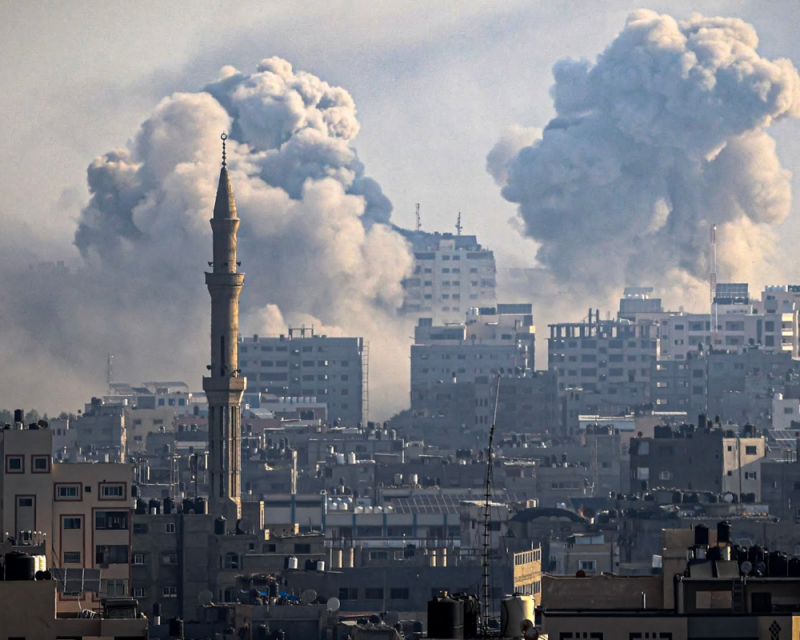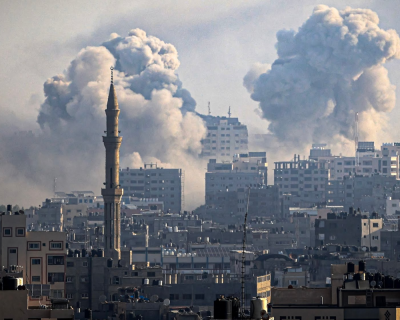As Israeli airstrikes continue in the Gaza Strip ahead of an anticipated ground invasion, the despair among the residents escalates by the hour due to water shortages, accumulating garbage, the destruction of their homes, and hospitals struggling to handle the deteriorating health situation. In a desperate attempt to obtain drinking water, some people have begun digging wells in areas near the sea or relying on salty tap water from Gaza's only aquifer, which is contaminated with sewage and seawater.
Two residents from Khan Younis in southern Gaza volunteered to fill plastic bottles with water to distribute to displaced families. Some residents are praying for an end to the war between Israel and Hamas, which has raised fears of a wider conflict in the Middle East. They reported that the airstrikes last night were the heaviest during the nine-day raging conflict. Many homes have been leveled, and Gaza authorities have stated that at least 2,750 people, most of whom are civilians including over 700 children, have been killed, with around ten thousand others injured. There are about a thousand people missing, believed to be under the rubble.
Israel has imposed a total blockade while preparing for a ground attack in Gaza, mobilizing troops and tanks at the border. They have vowed to crush Hamas, which governs the area in response to an attack launched by its fighters on Israeli towns nine days ago, resulting in 1,300 deaths, including children, and hostage-taking in the worst assault on civilians in Israel's history. The Israeli army has reported that at least 291 soldiers have been killed. Hamas has continued to launch rockets at Israel since the border attack. The Israeli army announced that sirens went off today in several towns in southern Israel.
Diplomatic efforts are underway in an attempt to introduce aid into the strip through Egypt. Amid international calls for a ceasefire to allow aid entry, Israeli Energy Minister Israel Katz stated that there would be no lifting of the blockade without the release of Israeli hostages. The Israeli army confirmed on Monday that 199 people are being held as hostages in Gaza.
### Concerns About a Health Crisis
Gaza is one of the most densely populated places on earth, and currently has no exit. Egypt, which also shares a border with the strip, has so far resisted calls to open it to fleeing residents. Mohammed Saqar said, "There is no water due to the large number of people inside the camp, so I thought to volunteer and came with a tricycle to carry water from distant and dangerous areas to distribute it to people." He added, "Now we fill salty water, and I am ready to drink it; what can we do?"
Even before the recent outbreak of conflict and the cut-off of electricity and fresh water supplies by Israel, about 90% of the water was deemed undrinkable, according to the Palestinian Water Authority. The only aquifer in the strip is contaminated with sewage, chemicals, and seawater, and water desalination facilities in neighborhoods and public taps are a lifeline for some of Gaza's 2.3 million residents. Even the ten percent of aquifer water considered potable is often mixed with low-quality water during distribution, rendering it only suitable for other uses.
Many families in Gaza have opted to dig private wells to draw deep underground water, with a few who can afford it leaning towards purchasing bottled water. Others buy treated water at lower prices from trucks that roam the streets. Garbage is also piling up in the streets and inside the shelters for the displaced, raising concerns about an impending health crisis. Mohammed Hadhod, a sanitation worker from Khan Younis, stated, "If the garbage continues to accumulate, it will cause diseases and epidemics."
Doctors are rushing to assist an increasing number of patients, including children injured in airstrikes, in overcrowded hospitals suffering from shortages of medication and fuel due to the blockade. Medical professionals say that only the most critical cases are undergoing surgeries due to insufficient resources.




